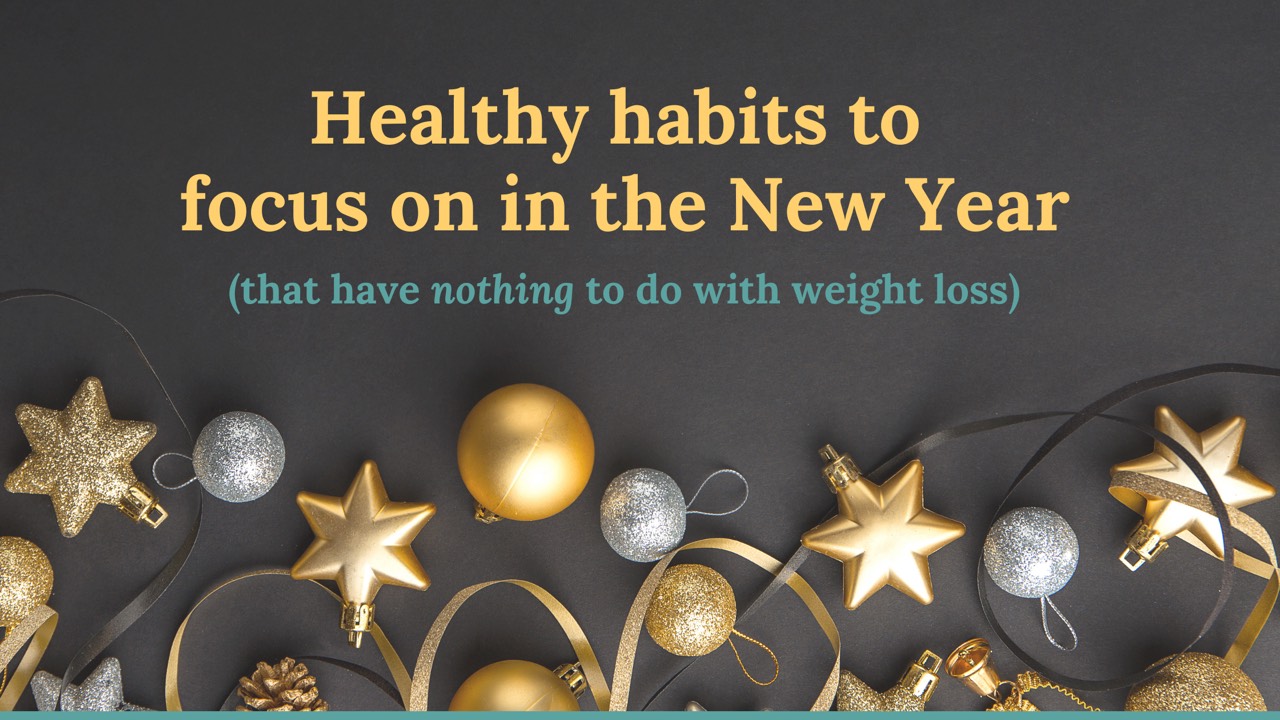BLOG
Find support not just for emotional eating, but all aspects of your well-being.
The Only Diet Rule You Need

Does this sound familiar: you’ve had a weekend of saying “screw it!” and have eaten every food you can think you want (even if it doesn’t taste amazing). It’s now Sunday and you feel overfull, your brain is foggy, and you’re beating yourself up for all the things you ate. You decide that tomorrow you’re getting “back on the wagon” and will “be good” by starting a new diet. Rules are back on Monday! No sugar, less carbs, all protein and vegetables and definitely an hour or more at the gym.
Stop. Re-read that paragraph. Notice how this example goes from what feels like a free-for-all/there are no rules to adding in ALL the rules? This is called the binge/restrict cycle and the whole system keeps you stuck because you get fed up with how you feel when you’re overeating (so you set rules) and then you feel deprived by such a rigid way of eating that it is only natural for you to want some freedom around food.
This is a really common situation, so if this seems familiar and maybe you’ve e...
Finding Some Comfort While Grieving

We’re told that grief has stages that we move through, that there is an end to the process. But the truth is much more complex than that. While its intensity can lessen over time, there are often triggers, sometimes unexpected ones, that bring up feelings in new and painful ways.
And while grief is a common experience, it is still a topic many feel uncomfortable talking about. For example, if you’ve lost someone you love, others in your community might not know how to talk to you about it even if you want to keep the conversation—and memory—of your person present. Others often worry they are making you feel worse you by asking how you’re coping.
If you are struggling with grief right now, we want you to know there is no right or wrong way to move through it. To start, reach out to someone you trust or get support from a therapist to help guide you. You might be surprised how freeing it feels to have a safe space to cry or rage. This can create a release of emotions that you don’t hav...
Aligning Your Values with Your Relationships

When it comes to supporting our mental health, we tend to start with the big things: the quality of our sleep, what we eat, going to therapy, taking medication. This can lead to more confidence and awareness which are powerful tools! But you might also begin to notice that working on yourself has shifted your relationships with others in ways you didn’t expect.
As you implement changes in your life and your perspective shifts, you might find you grow annoyed or feel critical towards others you usually have felt ok around. You might even feel like you can’t show or talk about who it is you’re becoming. Your immediate reaction might be to blame yourself, piling on the guilt that you’re a “bad friend” or a “bad person” because you’re thinking about others differently, even critically.
If you dig past those uncomfortable feelings, you’ll notice that it isn’t about them, but that getting clearer on your values (and setting boundaries that go along with them) means you no longer align with...
How Mindfulness Can Help with Emotional Eating

From easy-to-use apps to therapy practices, mindfulness seems to be an ever-present technique for managing our fast-paced world. But is it more than just a buzzword? Research shows that being more mindful can reduce stress and anxiety, alleviate depression, support your physical health, and more!
In today’s blog post, we’re breaking down just how you can implement this powerful tool into your life with just a few minutes at a time.
What is mindfulness?
Mindfulness is bringing awareness to the present moment. This looks like tapping into what your body is feeling, what thoughts or feelings are floating to the surface, and what you can see and feel (like the sunshine on your face). That might sound intimidating—especially if you’re someone who eats to avoid intense emotions—but acknowledging sensations, smells, and in the present moment means you can let go of anxiety of the future or grief over the past.
How can it help me with my emotional eating?
Emotional eaters often reach for ...
Client Insight: “I lost weight, but my brain still criticized my body size.”

The following blog posts talks about weight loss. If this is something that might bring up negative feelings for you, please skip this post to protect your mental and physical health.
Weight loss can happen for all kinds of reasons, from anxiety to happiness to stress to a change in routine. So, it should come as no surprise that emotional eaters come in all shapes and sizes! What I often hear from clients who have lost weight on their journey is that they still find themselves criticizing their body in the same way as when they weighed more.
Does that surprise you?
Many people I work with at the Centre for Emotional Eating believe that if they could just “get a handle” on their emotional eating that everything would all into place—their waistline would shrink, they’d be a kinder person, get that promotion, they’d finally do that thing they’ve always want to.
This is why dieting is so tempting: it markets itself as a cure-all when in reality it keeps you stuck in failure mode beca...
Client Insight: “My emotional eating led to weight loss—it was celebrated, but I felt awful.”

It’s true that we never really know what someone else is going through. We’ve covered in another post how not all emotional eaters are overweight, and sometimes emotional eating can lead to weight loss in an unexpected way.
For some clients, when emotions run high, they feel the need to control their eating as a way of trying to control their lives. For them it feels like the only thing they have power over is what they put in their mouth—not their kid’s tantrum, their boss’s feedback, or their partner’s attitude.
While in this scenario there is an absence of food, instead of a binge, it is still emotional eating because a person’s eating pattern has changed in response to emotional experiences. For example, this can look like telling yourself you’re too busy to eat, believing you’re not worthy of nourishment, not having motivation to cook and eat, or feeling a physical surge of anxiety that makes your stomach queasy. Experiencing these actions long enough can lead to weight loss.
T...
How to Explain Emotional Eating to Others

There may come a time on your journey where you feel like you want to explain how and why you emotionally eat to those you trust. You might feel in your gut that you would benefit from opening up and sharing your experiences. But emotional eating is complex, where should you even begin? We’ve got a number of concrete examples below to help guide you!
We want to be clear: you don’t have to explain or justify your feelings or actions to others. This post is intended to support those who feel like speaking about their experiences to someone they trust will help support them on their journey. Remember: no one gets to comment on your body (even if it is weight loss).
A good first step is to check in with your person and see if they have capacity for you to share. This can set the tone of your interaction by encouraging limiting distractions, finding a quiet space, and making sure they are in a good mental place to support you.
Start by explaining the link between emotions and food, that ...
5 Reasons Why You Emotionally Eat at Night (And what to do about it)

We recently asked our followers what time of day they feel is the worst for their emotional eating. And an overwhelming number of you said night time. Know that you are not alone! It is incredibly common to have the evenings be a time where emotional or binge eating ramps up. And there are very good reasons why you overeat late at night, and none of them are because you’re “crazy” or “lack willpower.” Here are 5 common reasons emotional eating comes up at night and what you can do to address each one.
You ate how you “should” during the day. Restricting what and how much you eat throughout the day will ultimately lead to binge eating (even if you are trying to “reset” from your last binge!). Not only is your body asking for more food, it is asking for food that is pleasurable. At the end of the day, you’re left feeling hungry and unfulfilled.
- Solution: No matter what you ate the night before, start the next day off with a clean slate: have foods you enjoy all day or earlier in the ...
3 New Year’s Resolutions That Aren’t About Your Weight

January always has that fresh feeling! There are 12 months to come and the possibilities feel endless. This might give you the knee-jerk feeling to set all the goals, including weight loss ones. You might be thinking, in this atmosphere that feels like anything is possible, that *this* year is the one you “lose the weight for good.” You’ve made a grocery list, thrown out the last of the holiday foods, and you signed up for that new gym membership.
But did you know that about 95% of diets fail? January might feel new and exciting, but many weight loss resolutions end before it even becomes February. That’s because restriction sets you up for binge eating—it becomes a cycle where you are depriving yourself “on the wagon” and then feel out of control when you give into cravings.
Instead of focussing on the number on the scale, here are examples of New Year’s resolutions to support your mind, body, and soul!
Add happiness habits.
You’ll notice this one is about adding in new things, in...
4 Self-Care Tips to Manage Seasonal Affective Disorder (SAD)

Seasonal Affective Disorder, or SAD, will look a little different for everyone. But if you notice you’re more irritable, your sleeping or eating patterns have changed, or you’re more anxious or depressed, you might be experiencing SAD.
We’re sharing four things that can help you find a mood boost in the darkest, coldest days of winter. We recommend creating a list you can easily reference, either in a notebook or on your phone’s notes app, of things that make you feel good. Either take inspiration from the ideas below or brainstorm your own! Personalizing an approach to support yourself through the next few months is a great way to show yourself some love.
Support
This can come in many forms, like a regular coffee date with a friend, scheduled therapy sessions, or speaking to your doctor about medication. Consider who in your life makes you feel supported and tap into that! If you feel intimidated going to the doctor, read this blog post for a little confidence boost.
Hygiene
When...


